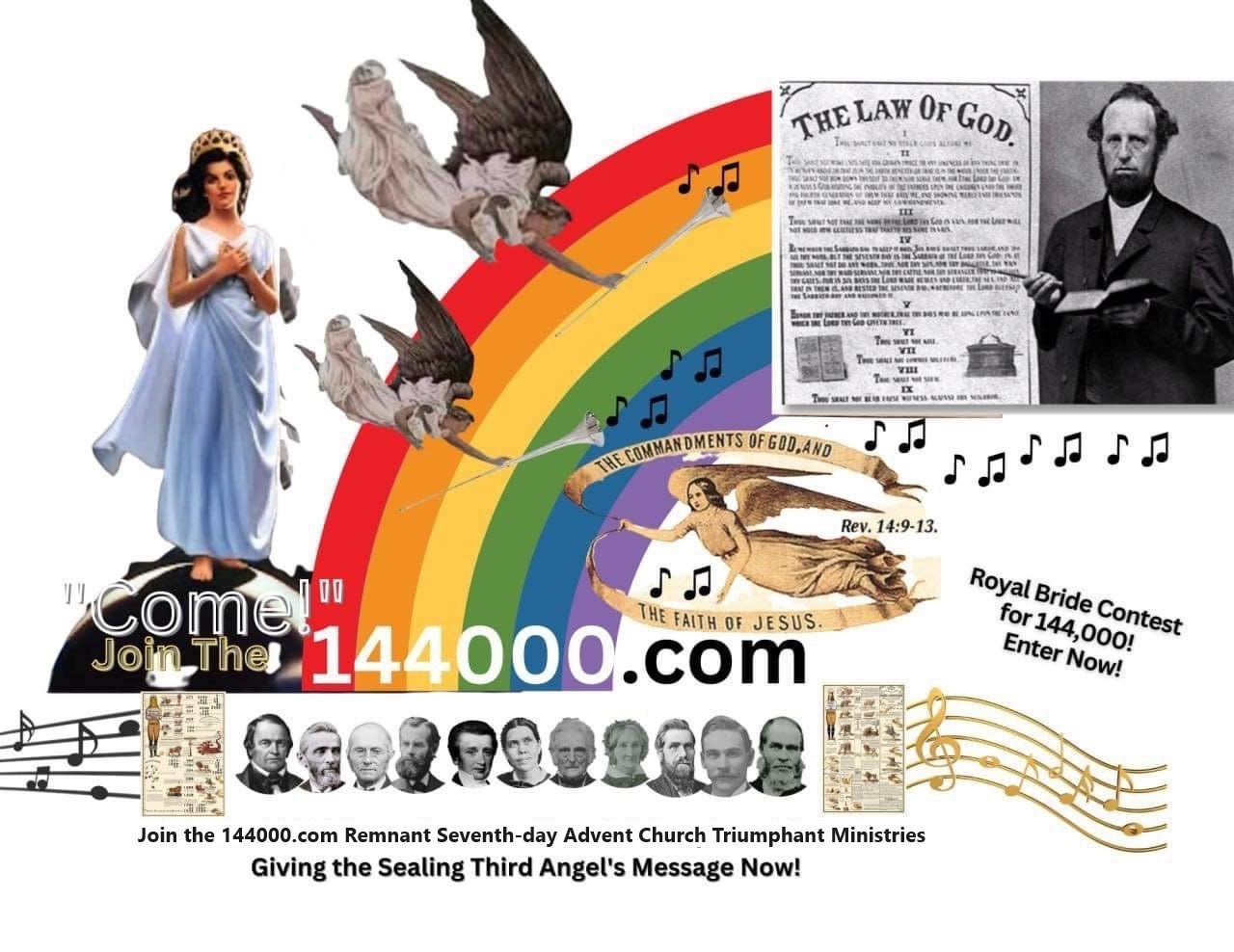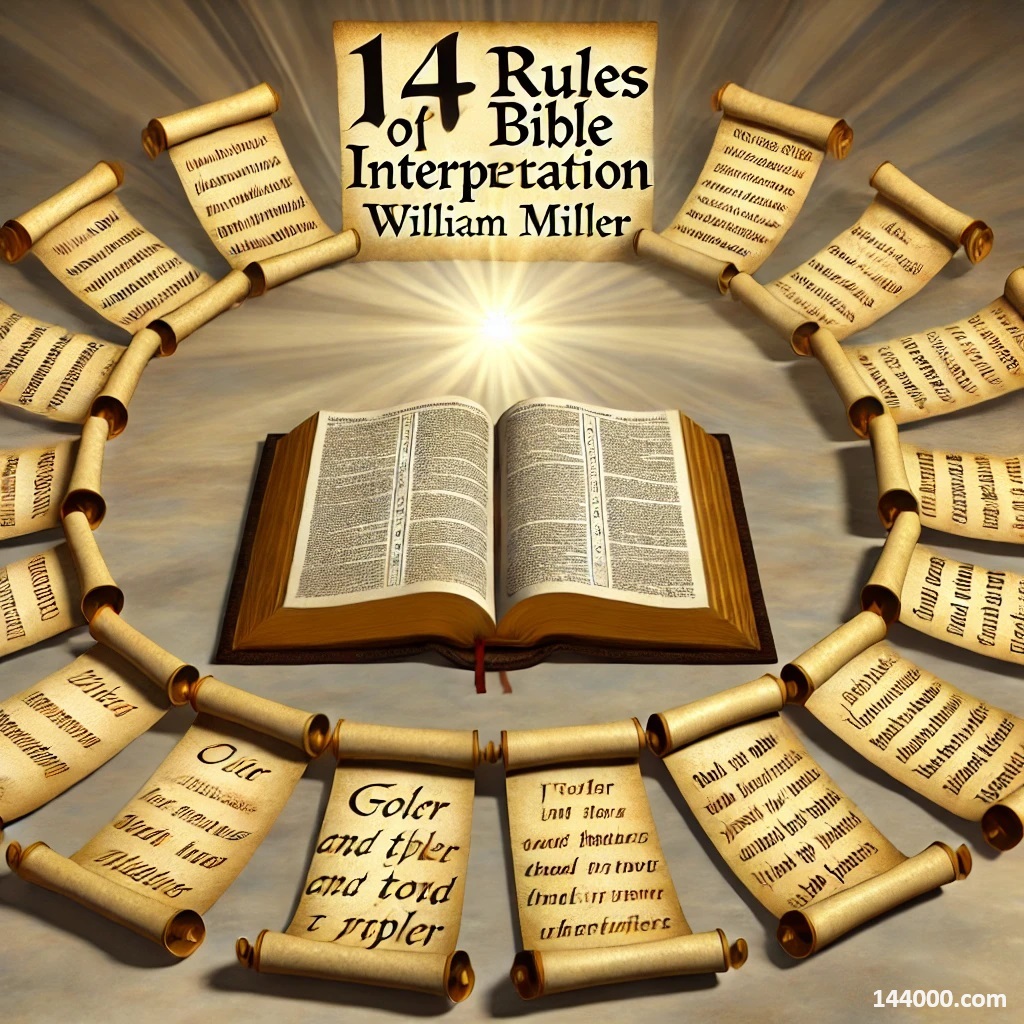
"Whom shall he teach knowledge? and whom shall he make to understand doctrine? them that are weaned from the milk, and drawn from the breasts. For precept must be upon precept, precept upon precept; line upon line, line upon line; here a little, and there a little:" Isaiah 28:9, 10
William Miller's 14 Rules of Bible Interpretation: The Definitive Guide to Understanding Prophecy

Explore William Miller's 14 Rules of Bible Interpretation, a guide to prophetic understanding rooted in the 144,000 movement (1840-1850). Learn below how these timeless principles keep believers anchored in God's eternal truth.As Christ sat looking upon the party that waited for the bridegroom, He told His disciples the story of the ten virgins, by their experience illustrating the experience of the church that shall live just before His second coming.
The two classes of watchers represent the two classes who profess to be waiting for their Lord. They are called virgins because they profess a pure faith. By the lamps is represented the word of God. The psalmist says, “Thy word is a lamp unto my feet, and a light unto my path.” Christ’s Object Lessons, p. 406.2
Trimming of the lamps: This action by the Ten Virgins is defined for us by the Testimony of Jesus, as an INTENSE STUDY OF THE SCRIPTURES.
"At the call, “The Bridegroom cometh; go ye out to meet him,” the waiting ones “arose and trimmed their lamps;” they studied the Word of God with an intensity of interest before unknown. Angels (144,000 historical SDA Spirit-begotten believers/Zion/Church Triumphant/New Jerusalem/Mother of God's People/Bride of Christ) were sent from Heaven to arouse those who had become discouraged, and prepare them to receive the message." The Great Controversy 1888, p. 401.2
COL 408-411:
- In the parable, all the ten virgins went out to meet the bridegroom. All had lamps and vessels for oil. For a time, there was seen no difference between them.
- So with the church that lives just before Christ's second coming.
- All have a knowledge of the Scriptures.
- All have heard the message of Christ's near approach and confidently expect His appearing. But as in the parable, so it is now. A time of waiting intervenes, faith is tried; and when the cry is heard, … many are unready. They have no oil in their vessels with their lamps. They are destitute of the Holy Spirit [presence and power of Christ's God-like character in them - the word of God lived out in their daily choices].
Behold! The Bridegroom cometh! Come OUT to MEET Him! (Matthew 25:6), "We do not see Christ in person. It is by faith that we behold Him. Our faith grasps His promises. Thus it was that Enoch walked with God." GH March 1, 1901, par. 14.
Father William Miller (1782-1849) - Age 67
Bio: William Miller is often regarded as the founder of the Millerite movement, which anticipated the Second Advent of Jesus Christ based on his interpretation of the 2300-day prophecy in Daniel 8:14, leading to the Great Disappointment of 1844. Hiram Edson, praying in the barn with another brother and then walked in the field where God revealed to him that the date was right but it was the event that was wrong. The event was that Christ our High Priest moved from the Holy Place in the Heavenly Sanctuary to the Most Holy Place on October 22, 1844. This was the beginning of the investigative judgement where God started to pick 144,000 little flock to become the bride or remnant church triumphant for eternity.
Revelation 14:4-5 (KJV): "These are they which were not defiled with women; for they are virgins. These are they which follow the Lamb whithersoever he goeth. These were redeemed from among men, being the firstfruits unto God and to the Lamb. And in their mouth was found no guile: for they are without fault before the throne of God."
Notable Works:
“Those who are engaged in proclaiming the third angel’s message are searching the Scriptures upon the same plan that Father Miller adopted." — Ellen G. White, Review and Herald, November 25, 1884.
In the little book entitled Views of the Prophecies and Prophetic Chronology, Father Miller gives the following simple but intelligent and important rules for Bible study and interpretation:
“‘1. Every word must have its proper bearing on the subject presented in the Bible; 2. All Scripture is necessary, and may be understood by diligent application and study; 3. Nothing revealed in Scripture can or will be hid from those who ask in faith, not wavering; 4. To understand doctrine, bring all the scriptures together on the subject you wish to know, then let every word have its proper influence; and if you can form your theory without a contradiction, you cannot be in error; 5. Scripture must be its own expositor, since it is a rule of itself. If I depend on a teacher to expound to me, and he should guess at its meaning, or desire to have it so on account of his sectarian creed, or to be thought wise, then his guessing, desire, creed, or wisdom is my rule, and not the Bible.’
“The above is a portion of these rules; and in our study of the Bible we shall all do well to heed the principles set forth.” — Review and Herald, November 25, 1884
Genuine faith is founded on the Scriptures; but Satan uses so many devices to wrest the Scriptures and bring in error, that great care is needed if one would know what they really do teach. It is one of the great delusions of this time to dwell much upon feeling, and to claim honesty while ignoring the plain utterances of the word of God because that word does not coincide with feeling. Many have no foundation for their faith but emotion. Their religion consists in excitement; when that ceases, their faith is gone. Feeling may be chaff, but the word of God is the wheat. And "what," says the prophet, "is the chaff to the wheat?"
None will be condemned for not heeding light and knowledge that they never had, and they could not obtain. But many refuse to obey the truth that is presented to them by Christ's ambassadors, because they wish to conform to the world's standard; and the truth that has reached their understanding, the light that has shone in the soul, will condemn them in the Judgment. In these last days we have the accumulated light that has been shining through all the ages, and we shall be held correspondingly responsible. The path of holiness is not on a level with the world; it is a way cast up. If we walk in this way, if we run in the way of the Lord's commandments, we shall find that the 'path of the just is as the shining light, that shineth more and more unto the perfect day.'" — Review and Herald, November 25, 1884, par. 26-27

William Miller's 14 Rules of Bible Interpretation
1. Every word must have its proper bearing on the subject presented in the Bible.
2. All Scripture is necessary, and may be understood by diligent application and study.
"All scripture is given by inspiration of God, and is profitable for doctrine, for reproof, for correction, for instruction in righteousness." — 2 Timothy 3:16, KJV
3. Nothing revealed in Scripture can or will be hid from those who ask in faith, not wavering.
"If any of you lack wisdom, let him ask of God, that giveth to all men liberally, and upbraideth not; and it shall be given him. But let him ask in faith, nothing wavering. For he that wavereth is like a wave of the sea driven with the wind and tossed." — James 1:5-6, KJV
4. To understand doctrine, bring all the Scriptures together on the subject you wish to know; then let every word have its proper influence, and if you can form your theory without a contradiction, you cannot be in error.
"Whom shall he teach knowledge? and whom shall he make to understand doctrine? them that are weaned from the milk, and drawn from the breasts. For precept must be upon precept, precept upon precept; line upon line, line upon line; here a little, and there a little." — Isaiah 28:9-10, KJV
5. Scripture must be its own expositor, since it is a rule of itself. If I depend on a teacher to expound to me, and he should guess at its meaning, or desire to have it so on account of his sectarian creed, or to be thought wise, then his guessing, desire, creed, or wisdom is my rule, and not the Bible.
"Knowing this first, that no prophecy of the scripture is of any private interpretation." — 2 Peter 1:20, KJV
6. God has revealed things to come, by visions, in figures and parables; and in this way the same things are often time revealed again and again, by different visions, or in different figures and parables. If you wish to understand them, you must combine them all in one.
"Whom shall he teach knowledge? and whom shall he make to understand doctrine? them that are weaned from the milk, and drawn from the breasts. For precept must be upon precept, precept upon precept; line upon line, line upon line; here a little, and there a little." — Isaiah 28:9-10, KJV
7. Visions are always mentioned as such.
"I have also spoken by the prophets, and I have multiplied visions, and used similitudes, by the ministry of the prophets." — Hosea 12:10, KJV
8. Figures always have a figurative meaning, and are used much in prophecy to represent future things, times, and events, such as mountains, meaning governments; beasts, meaning kingdoms; waters, meaning people; lamp, meaning Word of God; day, meaning year.
"These great beasts, which are four, are four kings, which shall arise out of the earth." — Daniel 7:17, KJV
"And he saith unto me, The waters which thou sawest, where the whore sitteth, are peoples, and multitudes, and nations, and tongues." — Revelation 17:15, KJV
"Thy word is a lamp unto my feet, and a light unto my path." — Psalm 119:105, KJV
"After the number of the days in which ye searched the land, even forty days, each day for a year, shall ye bear your iniquities, even forty years, and ye shall know my breach of promise." — Numbers 14:34, KJV
"And when thou hast accomplished them, lie again on thy right side, and thou shalt bear the iniquity of the house of Judah forty days: I have appointed thee each day for a year." — Ezekiel 4:6, KJV
9. Parables are used as comparisons to illustrate subjects, and must be explained in the same way as figures by the subject and Bible.
"And he spake many things unto them in parables, saying, Behold, a sower went forth to sow." — Matthew 13:3, KJV
"All these things spake Jesus unto the multitude in parables; and without a parable spake he not unto them." — Matthew 13:34, KJV
10. Figures sometimes have two or more different significations, as day is used in a figurative sense to represent three different periods of time.
"For I have laid upon thee the years of their iniquity, according to the number of the days, three hundred and ninety days: so shalt thou bear the iniquity of the house of Israel." — Ezekiel 4:5, KJV
11. If a word makes good sense as it stands, and does no violence to the simple laws of nature, it is to be understood literally; if not, figuratively.
"And if thy right eye offend thee, pluck it out, and cast it from thee: for it is profitable for thee that one of thy members should perish, and not that thy whole body should be cast into hell." — Matthew 5:29, KJV
12. To learn the true meaning of figures, trace your figurative word through your Bible, and, where you find it explained, put it on your figure, and, if it makes good sense, you need look no further; if not, look again.
"And he saith unto me, The waters which thou sawest, where the whore sitteth, are peoples, and multitudes, and nations, and tongues." — Revelation 17:15, KJV
13. To know whether we have the true historical event for the fulfillment of a prophecy, if you find every word of the prophecy (after the figures are understood) is literally fulfilled, then you may know that your history is the true event. But if one word lacks a fulfillment, then you must look for another event, or wait its future development. For God takes care that history and prophecy doth agree, so that the true believing children of God may never be ashamed.
"The vision is yet for an appointed time, but at the end it shall speak, and not lie: though it tarry, wait for it; because it will surely come, it will not tarry." — Habakkuk 2:3, KJV
14. The most important rule of all is, that you must have faith. It must be a faith that requires a sacrifice, and, if tried, would give up the dearest object on earth, the world and all its desires, character, living, occupation, friends, home, comforts, and worldly honors. If any of these should hinder our believing any part of God's word, it would show our faith to be in vain. Nor can we ever believe, so long as one of these motives lies lurking in our hearts. We must believe that God will never forfeit His word. And we can have confidence that He who takes notice of the sparrow's fall, and numbers the hairs of our head, will guard the translation of His own word, and throw a barrier around it, and prevent those who sincerely trust in God, and put implicit confidence in His word, from erring far from the truth.
"If any man will do his will, he shall know of the doctrine, whether it be of God, or whether I speak of myself." — John 7:17, KJV
'History of the Sabbath and First Day of the Week' By John Nevins Andrews (1829-1883) in PDF Format Now
